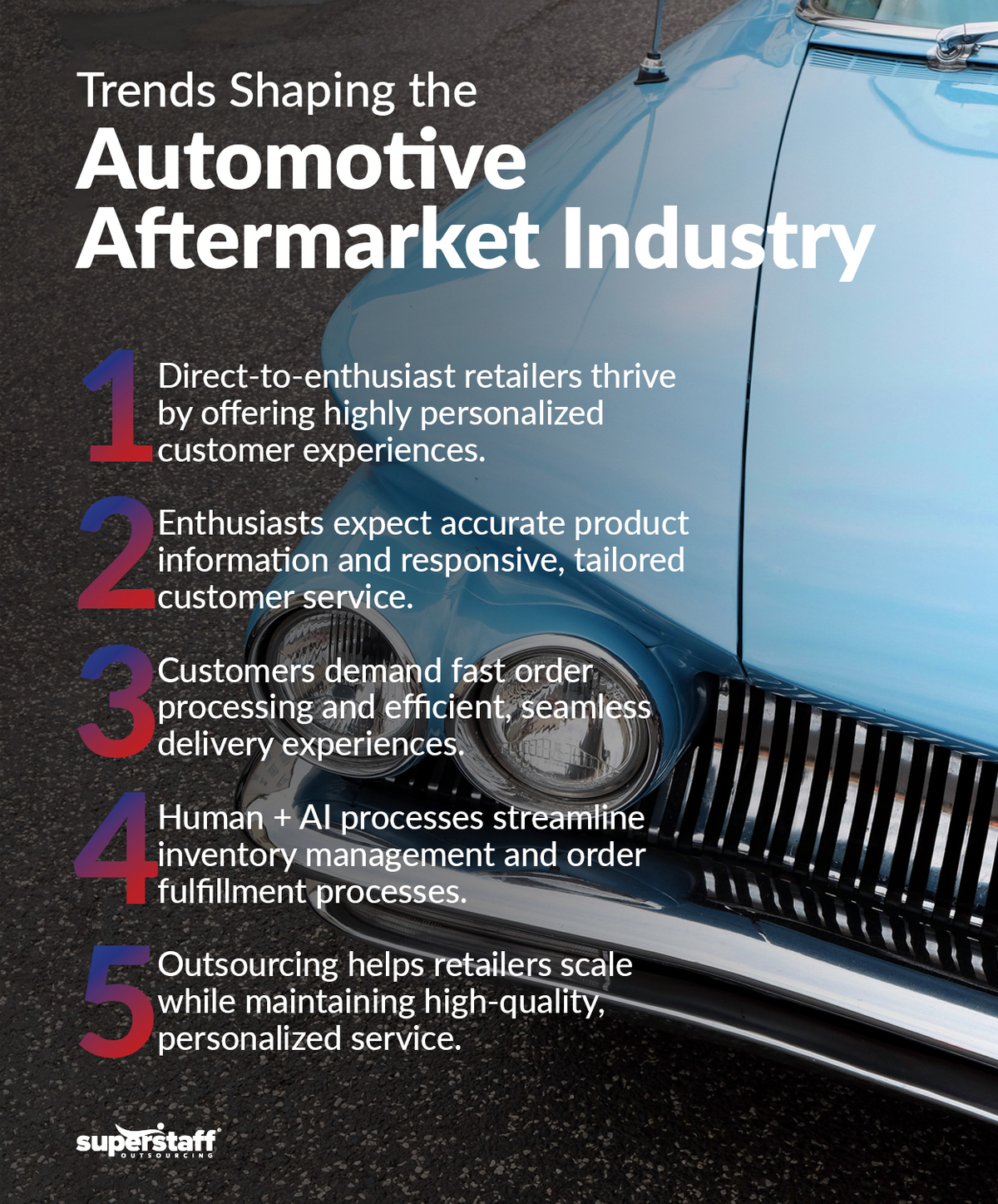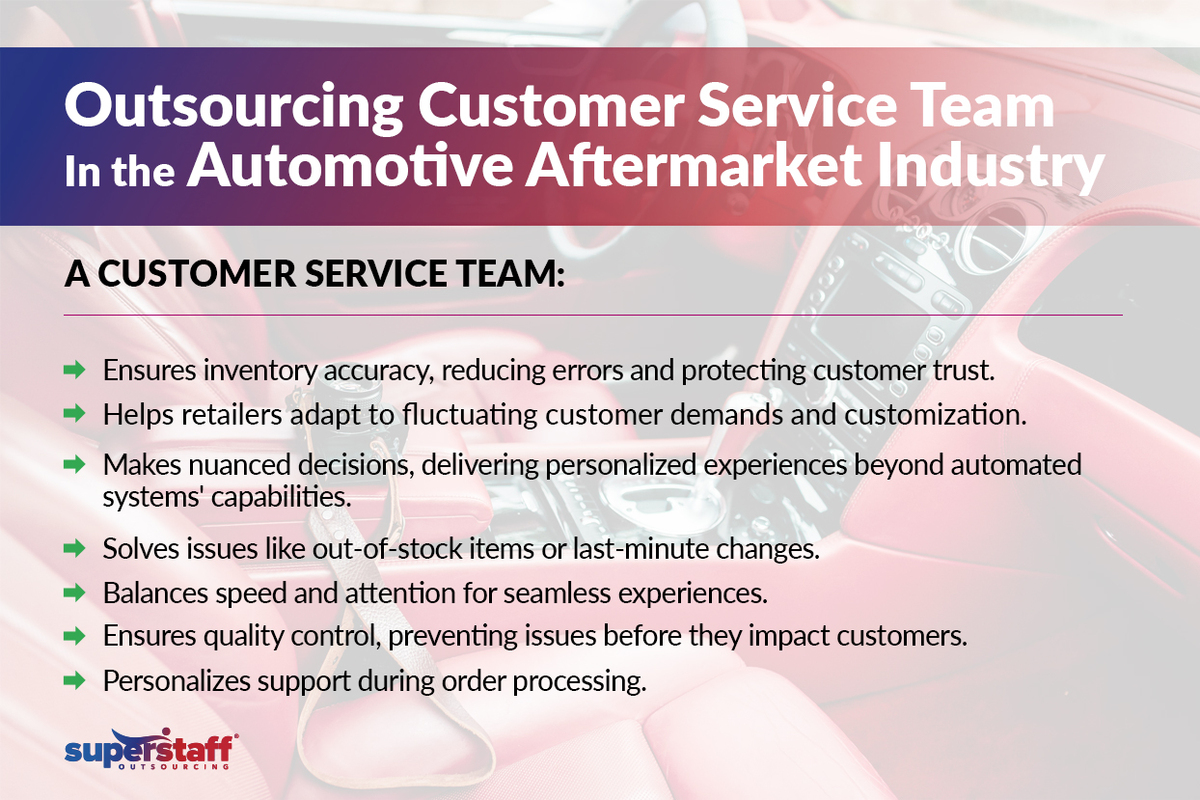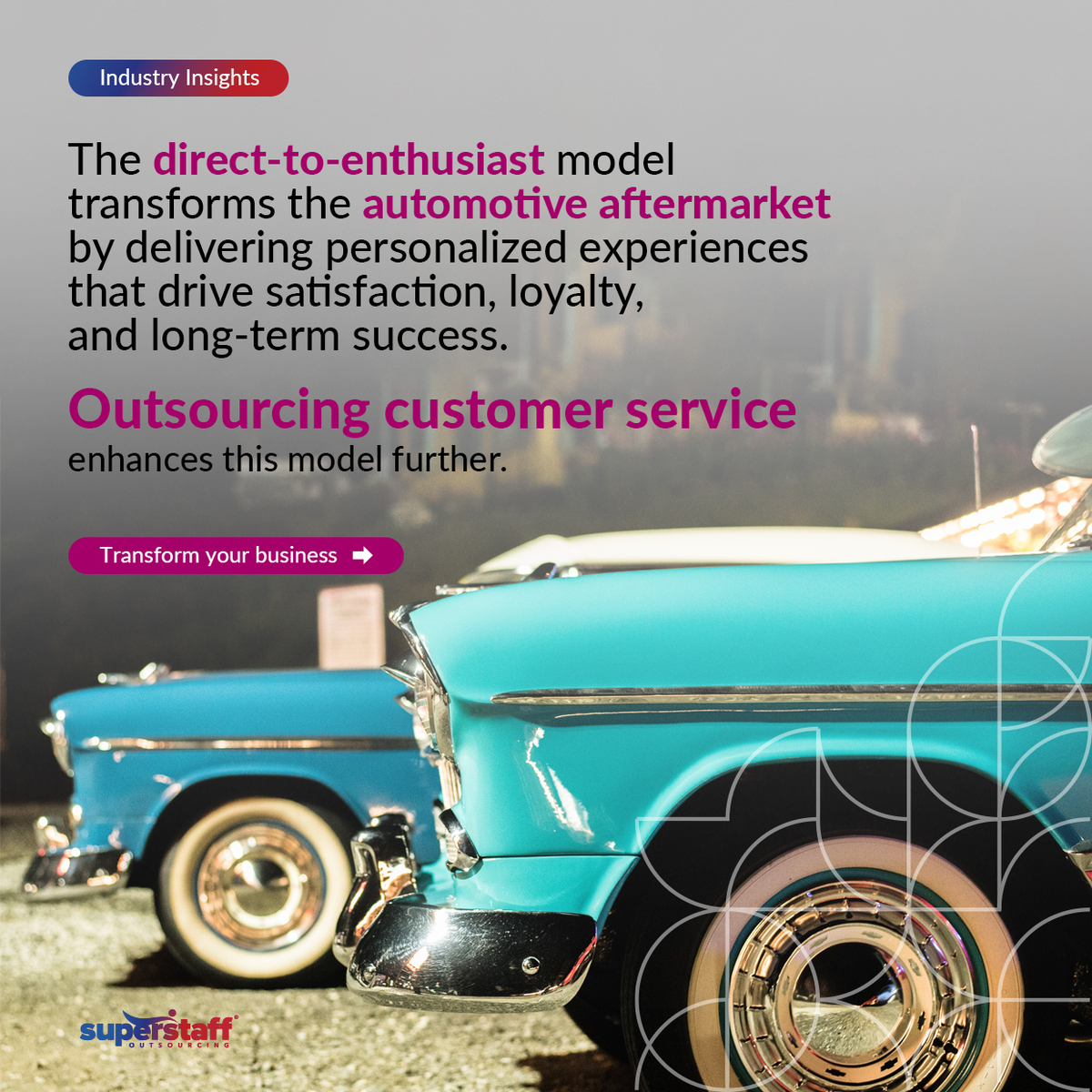
Automotive enthusiasts are no longer just buyers — they’re demanding partners in their journey. They expect you to anticipate their needs, offer personalized services, and deliver solutions instantly.
In the fast-evolving automotive aftermarket, direct-to-enthusiast retailers are transforming the game. They’re reshaping how customers engage with brands, raising the bar for customer service, inventory management, and order processing. To stay ahead, you must embrace these changes and meet the growing demands efficiently and precisely.
This article explores how innovative retailers are revolutionizing automotive customer service through streamlined operations and enhanced personalization and what these shifts mean for the future of the automotive aftermarket.
The Shift to Direct-to-Enthusiast Retail in the Automotive Aftermarket
The direct-to-enthusiast retail model is transforming the automotive aftermarket. As more companies adopt this approach, the industry is becoming increasingly connected with passionate consumers who are knowledgeable about the products they seek.
This shift is also challenging traditional automotive retail models. The direct-to-enthusiast approach emphasizes personalized services, allowing customers to select vehicles directly and offering premium experiences that these informed buyers are willing to invest in.
The Importance of Catering to Enthusiasts’ Unique Needs and Preferences
Car enthusiasts are passionate, discerning, meticulous consumers with specific preferences and high expectations. These customers demand unparalleled customization and attention to detail when selecting and modifying their vehicles, making their needs varied and unique.
The direct-to-enthusiast retail model is vital in meeting these expectations. It allows customers to fully personalize their vehicle choices, delivering tailored solutions that cater to their distinct preferences while ensuring convenience and ease of use. This personalized approach is critical in enhancing the customer experience in the automotive aftermarket.
The custom car market’s rapid growth underscores this community’s power. According to industry reports, the global customized car market is experiencing a compound annual growth rate (CAGR) of 4.2% and is projected to capture significant market share by 2033. This trend highlights the economic influence of car enthusiasts and the financial opportunities for businesses catering to this segment.
The custom car market’s innovation and creativity extend beyond just vehicles, influencing other industries as well. With a wide range of options for both design and technical functionalities, consumers are driving advancements in customization, further expanding the market’s reach and impact.
Example of Successful Direct-to-Enthusiast Retailers in the Market
A prime example of a successful direct-to-enthusiast retailer is Tesla. Tesla’s innovative vehicle-selling approach has disrupted the automotive industry and redefined customer expectations. Instead of mass-producing affordable vehicles, Tesla focused on creating a premium, captivating product emphasizing quality over quantity. This strategy generated strong market demand for electric cars, positioning Tesla as a leader in the space.
Tesla’s direct-to-consumer sales model is another critical component of its success. Tesla has complete control over the sales experience by selling directly to customers, from vehicle showrooms to online platforms. This approach enables Tesla to offer a highly personalized buying process, allowing customers to customize their vehicles and easily purchase online.
The company’s attention to detail, focus on customer experience, and direct engagement with enthusiasts have solidified Tesla’s status as a successful direct-to-enthusiast retailer.
Navigating Changing Customer Expectations Across the Industry

Customer expectations are continuously evolving, and the automotive industry is no exception. Today’s consumers demand personalized experiences and seamless, convenient purchasing processes. The COVID-19 pandemic accelerated this shift, as lockdowns pushed more customers toward online shopping, further integrating e-commerce into daily life. The key takeaway? Convenience and a frictionless buying experience are no longer optional — they’re essential.
This shift has contributed to the rise of the direct-to-consumer (DTC) model, where companies sell products directly to customers, bypassing traditional retail channels. Statista data shows U.S. DTC companies generated an estimated $135 billion in revenue in 2023, with projections to reach $187 billion by 2025. As this model grows, so do customer expectations, making it critical for businesses to adapt.
The Role of Streamlined Inventory Management in Enhancing Customer Experience
Effective inventory management is a critical factor in the success of direct-to-enthusiast operations. Your products and services hinge on the efficiency of your inventory system, which directly impacts customer satisfaction and timely delivery.
Key considerations like inventory availability, storage costs, and real-time tracking are essential to smooth operations. Implementing efficient inventory management reduces delays, prevents stock shortages, and ensures quick, accurate deliveries—ultimately enhancing the customer experience and driving business success.
The Use of Advanced Inventory Management Software To Optimize Stock Levels
Effective inventory management is essential for success, yet many companies struggle. A survey by The European found that 60% of DTC companies are less than 80% accurate in their inventory management. This lack of precision hinders their performance and prevents them from fully optimizing operations. For automotive retailers, proper inventory management is not just a logistical task—it’s the foundation for success and a key driver of customer satisfaction.
In the automotive aftermarket, offering a personalized experience requires managing a wide array of custom parts, both technical and cosmetic, as well as the final vehicle itself. Real-time visibility into stock levels is critical to ensuring a smooth customer experience.
Advanced inventory management software, such as real-time inventory trackers, can help you optimize stock levels and provide detailed insights into your supply chain. Outsourcing inventory management to a specialized team can further enhance this process, as these teams are well-versed in the latest technology and can streamline operations efficiently.
The Impact of Inventory Accuracy on Customer Trust and Loyalty
Inventory accuracy plays a pivotal role in fostering customer trust and loyalty. Imagine this scenario from a customer’s perspective: You visit an online store, find the product you want, read the reviews, and place an order. But after completing the purchase, you’re notified that the item is out of stock, causing delays or even a canceled order.
Such experiences illustrate how inaccurate inventory management can erode customer trust and damage your brand’s reputation. Data shows that 34% of businesses have delayed shipping due to selling out-of-stock items. Inaccuracies like these disrupt the customer experience and poorly affect your ability to deliver on promises.
Accurate inventory management builds credibility and ensures customers trust your brand to meet their expectations. It’s the cornerstone of long-term loyalty in the direct-to-enthusiast model.
However, inventory accuracy is just one piece of the puzzle. Seamless order processing is crucial to providing a superior customer experience in today’s competitive market.
Revolutionizing Order Processing to Meet Enthusiast Expectations
Effective inventory management and seamless order processing are critical in meeting the high expectations of automotive enthusiasts. Efficient order processing leads to higher customer satisfaction, streamlines operations, and enhances customer fulfillment.
Automation and technology are critical enablers in this process, driving faster order turnaround times and improving overall service. While speed and convenience are essential, enthusiasts also expect personalized experiences. Therefore, integrating customer data and preferences into the order process is necessary to deliver tailored interactions and build lasting relationships.
The Role of Automation in Speeding Up Order Processing
Order processing is complex and requires precision. With the vast amount of data and the growing number of orders, manual processes can become overwhelming, leading to errors, miscommunication, and slower processing times — ultimately reducing customer satisfaction.
Automation offers a solution by streamlining order management and processing. Automated systems ensure customer orders are accurately processed with minimal errors or delays, resulting in a smoother operation. Automation also enhances transparency, allowing customers to track their orders in real-time and stay informed about the status of their purchases, from processing to delivery. This level of visibility fosters trust and improves the overall customer experience.
How Integrating Inventory Management with Order Processing Systems Improves Efficiency
One of the main challenges in order processing is integrating inventory management systems. With an efficient inventory management system, delays in deliveries and longer wait times are inevitable, leading to an efficient ordering process.
Automation and software integration are essential for synchronizing inventory management with order processing. Tools such as Warehouse Management Systems (WMS) provide real-time insights into stock levels, monitor the movement of goods, and ensure timely deliveries. By linking these processes, businesses can offer a more efficient and fulfilling customer experience, improving order processing speed and accuracy.
These advanced solutions allow you to meet and exceed customer expectations in the direct-to-enthusiast model, enhancing operational efficiency and building stronger customer loyalty.
Example of a Successful Automotive Retailer Using Streamlined Order Fulfillment Processes
Through its optimized supply chain strategy, BMW offers an excellent example of a streamlined order fulfillment process. By leveraging data analytics and AI-powered algorithms, BMW revolutionized its logistics and inventory management, making more informed business decisions and achieving exceptional control over inventory levels.
This technology-driven approach allows BMW to manage production and distribution better, ensuring a seamless process from order placement to delivery. By integrating these technologies, BMW enhances the customer experience, creating a more efficient, responsive, and personalized service that meets the high expectations of today’s automotive market.
Efficient inventory management and order processing are not just operational goals—they are critical to delivering an exceptional customer experience. As we look ahead, the future of the direct-to-enthusiast retail model in the automotive industry holds even greater promise.
The Future of Direct-to-Enthusiast Retail in the Automotive Aftermarket

Emerging technologies are reshaping the automotive aftermarket, bringing new opportunities and increasing customer expectations. AI, machine learning, and predictive analytics are among the innovations that automotive retailers must adopt to stay competitive. Keeping up with these trends is crucial to meeting the growing demands of the modern automotive enthusiast.
The Potential of AI to Optimize Inventory Levels Based on Predictive Analytics
AI holds significant potential for optimizing inventory management through predictive analytics. By anticipating customer demand and market trends, AI helps retailers ensure precise stock levels, reducing errors and improving inventory accuracy.
AI also provides real-time data analysis, offering insights into inventory levels and customer behavior. This allows automotive retailers to make proactive decisions based on real-time consumer trends, ensuring a seamless supply chain and more responsive service. By leveraging these tools, businesses can meet customer demands more effectively while minimizing operational inefficiencies.
The Importance of Continuous Innovation in the Direct-to-Enthusiast Market
Staying competitive in the direct-to-enthusiast market requires ongoing innovation, not just initial technological investments. As customer needs and expectations evolve, the automotive industry must remain adaptable. Enthusiasts will continue to demand more personalized, responsive services, and businesses that can flexibly respond to these changes will lead the market.
For automotive retailers, embracing and continuously adapting to new technologies is essential. These innovations are key to delivering exceptional automotive customer service and maintaining a strong foothold in the direct-to-consumer model. By staying ahead of trends and keeping innovation at the core of operations, businesses can create lasting success in this dynamic industry.
Outsource Your Inventory Management and Order Processing With a Reliable BPO Partner

As your base of passionate custom car consumers grows, one key question arises: How can you improve your automotive customer service? The answer lies in streamlining your inventory management and order processing — critical steps toward enhancing customer satisfaction and driving business success.
The automotive industry is evolving as the direct-to-enthusiast model gains momentum, offering customers a more personalized and optimized experience. With this evolution comes the need to adapt to emerging technologies such as artificial intelligence (AI) and automation software. Staying flexible and responsive to these advancements is essential for maintaining a competitive edge.
Investing in advanced optimization systems for inventory and order processing is crucial. At SuperStaff, we specialize in delivering professional, high-quality customer service for inventory management and order fulfillment. By outsourcing these essential functions, you can meet rising customer expectations while staying ahead of demand.
Achieve long-term success by partnering with us today!






